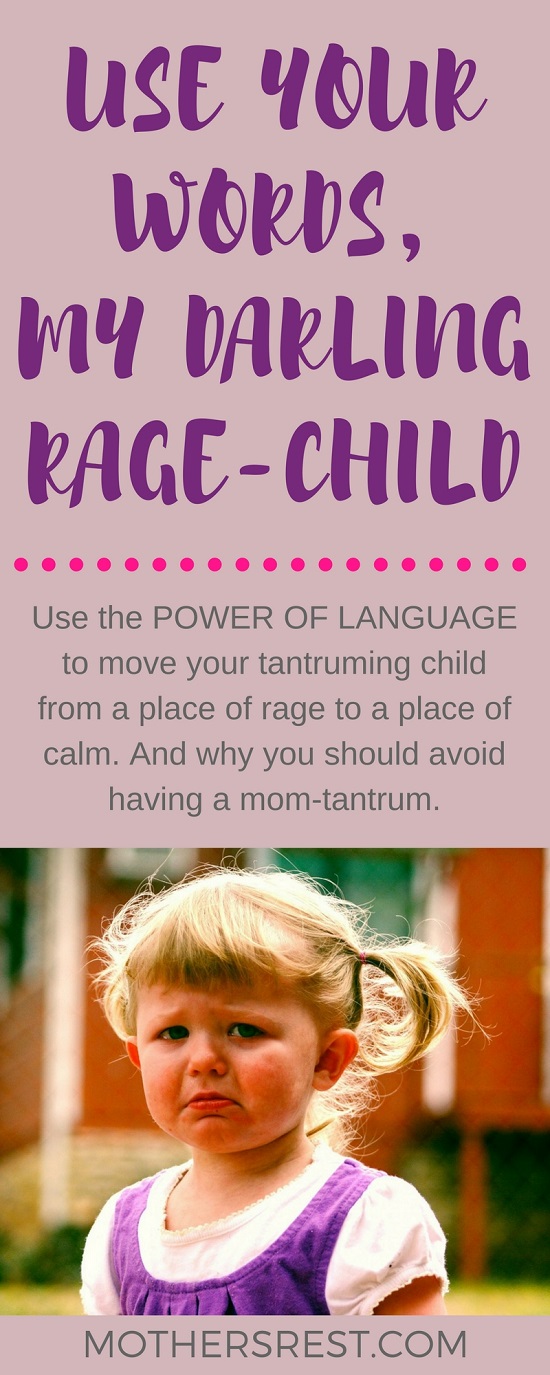My child is destined to be a sociopath.
How often does that cross your mind? Never? I don’t believe you.
How about when the bear lovie turns into a projectile aimed at #RockStarDad’s crotch? Or when the dog is pummeled with a plastic hammer? Or when there are LARGE TEARS, HUGE WAILS OF RAGE – for no apparent reason?
Yep, definitely a sociopath. (Or maybe just a normal 3-year-old.)
Y’all, I’ve discovered a secret: THE POWER OF LANGUAGE. To move your cute little, sociopath from a place of rage to a place of calm.
And to help you avoid having a mom-tantrum.
Threenagers are sociopaths
My three-year-old love-tyrant is a bit, shall we say, societally challenged at times. So I often wonder what the future will hold for him.
Then I had the great fortune of dragging him along to the pediatrician’s office when it was time for big brother’s shots (yes, I’m pro-vax.) Little brother cried through the whole experience – little brother, not big brother.
And I was BEYOND DELIGHTED. My little one worried himself to death that the nurse was out to get his beloved idol. I should have dropped everything and hugged him, but I couldn’t stop laughing. Ladies, it’s a miracle! That kid actually has empathy tucked somewhere inside his crazy, raging 3yo brain.
Looks like we’ve dodged the bullet on the sociopath theory. Because sociopaths have an “inability to feel sympathy for others or to understand the emotional consequences of their actions.”
Ok, then what about violent, dog-pummeling criminal? Think Michael Vick.
Threenagers are rage-opaths
I recently finished reading a book about mental disorders. (Fascinating bedtime read, yes, sir!)
Ready for a quote?
(I promise I’ll translate all this wonky talk – SO STICK WITH ME!)
…A significant finding in studies of murderers is that violent criminals typically have difficulty using language…
The verbal expression of thoughts is, of course, primarily a left-frontal function, and it is the [brain’s] frontal lobes that are “down” in rage disorders. It is not surprising that we…find language disabilities in violent people: the deficit in frontal-lobe function results in twin deficits in both impulse control and language ability.
Distressingly, if the language function of a tantrumer’s frontal lobes is compromised, he or she lacks yet another essential anger-management tool beyond the basic capacity of the frontal area simply to ride herd upon impulse.
Language, words, and symbols all act to capture and objectify our inner experience; language serves a natural delaying function that helps us to grasp what we are experiencing and formulate what we are going to do about it without resorting to blind rage.
— from Shadow Syndromes: The mild forms of major mental disorders that sabotage us by John Ratey and Catherine Johnson
Still with me? HOORAY! (Because, whoa, that was a mouthful. And I’ll wait if you want to reread it five more times.)
The following words may have jumped out at you:
–murderer
–violent
–difficulty using language
–impulse control
–tantrumer
–blind rage
Since we’ve ruled out sociopath, I’d say this list pretty much sums up life with a small child. Murderer of fun…difficulty using language…
So what can you do to make sure your darling, rage-child doesn’t turn into one of these violent criminals?
I have no idea. But my husband is a criminal defense attorney, so give me a call if you need him in, say, 15 years.
What I love about this cumbersome quote is that it talks about THE POWER OF LANGUAGE.
“Language serves a natural delaying function that helps us to grasp what we are experiencing and formulate what we are going to do about it without resorting to blind rage.”
The power of language
Here’s how to put the power of language to work with threenagers – or teenagers.
When dealing with non-verbal kiddos
Don’t start fretting that your 2yo still doesn’t talk and that she’s destined for a life of crime. Learning to talk takes a while. Some kids are more interested in climbing on the ceiling, others in playing ball. Then there are the ones that want to flush all your favorite earrings down the toilet… (Um, sociopaths.)
It can take a while for junior to really start using words – especially ones you understand.
Crying totally counts as language. And sometimes we moms get lucky and know exactly what those tears are all about.
Hangry? Sad? Jealous?
When the fists start flinging or feet start kicking, take a guess and tell your non-verbal, rage-child what emotions you see flying out of his foaming mouth. Calmly say, “You seem angry. Because I didn’t let you eat that lego.”
Help him start connecting the crazy inside his brain with what he wants. Give voice to his inner needs. Help him work through that rage to solve the issue of the hour.
When dealing with Chatty Cathy kiddos
For your verbal little bitty, ask her to USE YOUR WORDS. Then help her out, because tantrumers aren’t really excited that you want to spoil the party: “You seem upset. You don’t like it when your brother eats the last cupcake.” (Never mind that she herself already ate 5.)
Basically, you’re teaching your kid to NAME HER EMOTIONS.
Psychologist Dan Siegel, author of the book, The Whole-Brain Child: 12 revolutionary strategies to nurture your child’s developing mind, calls this practice: name it to tame it.
I can get behind that.
When I guess the emotions behind the rage with my boys, one of two things typically (sometimes) happens:
1) The child stops crying and corrects me, “No, mommy, I’m not mad. I’m sad.”
2) The child stops crying and looks at me curiously.
I’m happy with either result, because they both result in the child stops crying.
If you can pause the rage for even just a second, you give your kid a chance to find himself again. To see beyond all the feels he’s feeling right there on the floor in Walmart.
Also, it’s, like, even if I don’t get my kiddo to use his words, the child starts to calm down because I’M USING MY WORDS. I AM CALM. Instead of responding with a mom-tantrum.
By using language, I’m tapping into the part of my own brain where you’ll find creativity and problem solving skills. (That wonky “frontal lobe” from the quote.)
Then, instead of turning into the Wicked Witch, I can help my kid navigate through the rage back to reality so we can fix whatever’s ailing him. Another cupcake? Hell no, but you can have a glass of boring ole milk.
I love the phrase, “blind rage.” It means you’re out of control. You can’t see the path forward.
Language is the map to find that path again. To guide you back to the part of your brain where LIFE IS CALM.
Reach out to your kid with THE POWER OF LANGUAGE. Throw him some emotion words and see where that gets you.
Maybe your little guy is just furious that big brother is getting shot up with HUGE needles. And he really, really wants you to tell the syringe-wielding nurse to go to hell.
Share your thoughts below or on Facebook at MothersRest.
Photo credit from Pixabay.com

